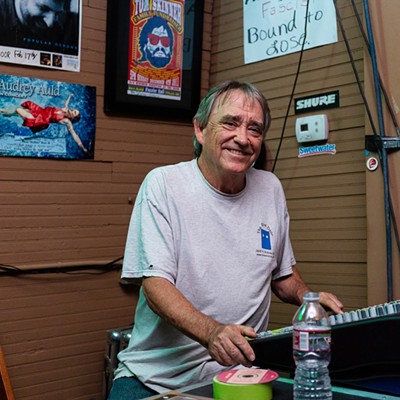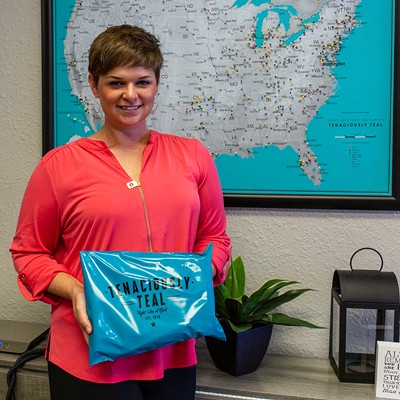Oklahoma Publishing Co., which owns The Oklahoman newspaper, NewsOK and a variety of other assets, announced it was being purchased by the Anschutz Corporation, owned by Colorado-based billionaire Philip Anschutz.
All stock of the privately owned OPUBCO is to be sold to Anschutz in early October, Christy Gaylord Everest, chairwoman and CEO of OPUBCO, said in the announcement.
The Oklahoman has been owned by the Gaylord family for more than 100 years, longer than Oklahoma has been a state, and has been an editorially conservative publication for almost all of its history. Everest said The Oklahoman’s conservative beliefs and values mirror those of Anschutz, an owner of several other publications.
Although the selling of one of the state’s two family-owned daily metropolitan papers marks the end of an era, it’s also the beginning of one. Once the purchase of OPUBCO is finalized, it will be the first newspaper owned by Anschutz that is the dominant daily in its market.
However, some say the driving force behind his reasons might not have been its flagship product — the newspaper — but rather some diversified assets.
‘Jewel-encrusted swizzle stick’
Two weeks prior to the OPUBCO announcement, Denver reporter John Rebchook heard an interesting rumor: Something big was about to happen with one of the most extravagant hotels in the Rockies, sources told him.
The rumor was The Broadmoor hotel, a five-star luxury resort in Colorado Springs owned by OPUBCO, was about to be sold to Anschutz, said Rebchook, a 30-year journalism veteran and former real estate editor for the Rocky Mountain News.
right Philip Anschutz is partial owner of the Los Angeles Lakers.
Rebchook, who reports for the website Inside Real Estate News, called OPUBCO to confirm the story, but was referred to Steve Bartolin, the CEO and president of The Broadmoor.
Bartolin, who told Oklahoma Gazette that he also sits on the OPUBCO board, told Rebchook the rumor was just that — a rumor — and that there were no plans to sell The Broadmoor. Lacking evidence that the sale was going down, Rebchook said he did not publish a story.
Then the confirming announcement came. Rebchook asked Bartolin why he had told him the sale wasn’t happening, and Bartolin said he was unaware a week before the sale, Rebchook wrote.
According to the OPUBCO announcement, board members were approached in early June.
Rebchook quoted Bartolin as saying the offer by Anschutz in June “was more of a Gaylord family thing.”
Like
many media companies affected by the economic downturn, the paper
implemented changes. Between 2008 and 2011, OPUBCO went from about 1,100
employees to 690.
Two
leadership positions hired in 2003 by Edward L. Gaylord recently
departed. Ed Kelley, who has been the paper’s editor since 2003 and
worked at the publication for more than 35 years, announced June 10 he
would become editor at The Washington Times. Kelly Dyer Fry became
editor of The Oklahoman and will serve as vice president of news for
OPUBCO.
About
10 days after the Kelley announcement, Oklahoman publisher David
Thompson announced he would retire Sept. 1. OPUBCO executive vice
president Christopher Reen is replacing him. In late June, Thompson said
the timing was “purely coincidental.”
right, The Broadmoor hotel, in Colorado
Everest said in a Sept. 15 announcement about the sale that Anschutz approached OPUBCO with a “unique offer” in early June.
Rebchook
also wrote that Anschutz previously expressed interest in purchasing
the hotel, only to be rebuffed, and it’s likely he found another way to
go after it by purchasing the whole company, rather than just the
property, which was likely the “jewel-encrusted swizzle stick that
stirred Anschutz’s interest in the entire company.”
The
diverse holdings of Anschutz resemble those held by OPUBCO, and the
daily may not have been the primary interest, said Peter Gade, a Gaylord
Family Endowed Professor in the Gaylord College of Journalism and Mass
Communication at the University of Oklahoma.
“Some
of the things I’ve read in The Oklahoman, if you look at the holdings
of these companies, I don’t think media were the driving force in this
purchase,” Gade said. “You look at the holdings of Anschutz and the
holdings of OPUBCO, and they’re pretty complementary: They’re in
entertainment, they’re in real estate, they’re in media. You couldn’t
almost take two different companies of such diverse holdings and put
them together. They really fit that closely. For Anschutz, I think some
of the interest has to do much more in the entertainment and real
estate.”
Since
both Anschutz Corporation and OPUBCO are both privately held companies,
the exact details of the deal may never be made public.
“It’s
always tricky when you’ve got two privately held companies dealing with
each other, what the value is,” said Rebchook. “I think you could
reasonably say it’s worth somewhere between $700 million to a billion or
more.”
About Anschutz
Anschutz
is notoriously media-shy, and the Anschutz Corporation declined to
comment for this story. Likewise, OPUBCO executives did not respond to
requests for comment.
However,
almost all previous reports on Anschutz make it clear that the Denver
billionaire, ranked by Forbes as the 39th richest person in the United
States and one of the wealthiest people on the planet, is an
extraordinarily savvy businessman with a knack for getting things done
both in business and politics.
After
his purchase of a struggling movie theater chain, Anschutz turned Regal
Entertainment Group into one of the largest U.S. theater companies,
Rebchook said.
“That
was a pretty brilliant move on his part. People were declaring movie
theaters dead when home theaters and DVDs were coming out,” Rebchook
said. “He made a ton of money.”
right, Anschutz, pictured with Henry Winkler
A
Russell, Kan., native and graduate of the University of Kansas, Anschutz
started out in ranching and oil and gas exploration, before investing
in railroads, media, entertainment and telecommunications companies.
Some
of the publications owned by Anschutz include the online hyperlocal
sites of the Examiner.com in several markets — including Oklahoma City —
as well as The Weekly Standard, The Washington Examiner and The San
Francisco Examiner. The Christian conservative also owns Walden Media,
the children’s film production and publishing company known for “The
Chronicles of Narnia,” “Holes,” “Ray” and “Waiting for Superman.”
Bartolin
said Anschutz is a regular visitor to The Broadmoor. While OPUBCO’s
ownership and excellent management brought forth a renaissance in the
hotel’s history — marked by expansion and investment — the diverse
holdings of both parties make the deal a perfect fit.
“I
think we’re fortunate going forward to have a quality owner like Mr.
Anschutz. He’s a good guy, number one,” Bartolin said. “Number two, he
has the resources and the passion that are important for a property like
this.”
In
terms of ideology, one profile on Examiner.com posits Anschutz as a
possible “conservative counterpoint to (liberal billionaire) George
Soros,” and the public records of the Anschutz Foundation show that, in
addition to hundreds of millions of dollars in donations to charity,
Anschutz gives heavily to conservative causes.
But along with some high-profile successes, there have also been some high-profile scandals.
The
Anschutz-founded Qwest, a telecommunications company, was severely
battered in the early to mid- 2000s after allegations of insider trading
and questionable accounting practices resulted in indictments of some
of the company’s top executives, billions of dollars in shareholder
losses and layoffs at the company, according to a 2006 Los Angeles Times
profile of the intensely private industrialist.
In
2005, Qwest paid a $250 million settlement to the Securities and
Exchange Commission on allegations of having about $2.5 billion in phony
revenue on its books, according to the Los Angeles Times, and agreed to
pay $400 million for resolution of a shareholders lawsuit. Prosecutors
did not suggest that Anschutz was involved in any wrongdoing, according
to Forbes.com, despite selling $1.5 billion in shares.
However,
he was forced to settle a 2003 lawsuit by then-New York Attorney
General Eliot Spitzer alleging that Anschutz had improperly received
Initial Public Offering stock from Salomon Smith Barney in exchange for
steering investment banking business to the company, according to the
Times report. The suit was settled for $4.4 million.
A brave new world
Anschutz,
who acquired the conservative Weekly Standard in 2009 from media mogul
Rupert Murdoch, owns Examiner newspapers in several cities.
The purchase of The Oklahoman is Anschutz’s first foray into owning a dominant metro daily, Gade said.
“In
Washington and San Francisco where they have the Examiners, those
papers exist as kind of the secondary papers in already well-established
newspaper towns,” Gade said. “The difference in this purchase is now
that Anschutz’s paper will be the primary paper. It would be surprising
to me if he gutted it.”
Jack Willis, adjunct professor at Oklahoma State University, said he hates to see the local paper sell.
It’s
not likely that news consumers and advertisers would see immediate,
sweeping changes in content, since most of the current structure will
remain the same, said Terry M. Clark, director of the Oklahoma
Journalism Hall of Fame and professor of journalism at the University of
Central Oklahoma.
“I
don’t think most people will see much of a difference in the paper, at
least in the short term, because basically you’re going to have the same
staff,” Clark said. “What it will mean in the long term is anybody’s
guess.
“Historically,
it’s a milestone, because it’s the end of a family newspaper, one
that’s been very, very active in state culture and politics. How that
will change, who knows?”
DETAILS OF THE DEAL
In
2003, when Edward L. Gaylord died, The Associated Press pegged the
value of both OPUBCO and Gaylord Entertainment at $2.5 billion.
Gaylord
Entertainment, which owns several hotels and entertainment venues,
split from OPUBCO and became a publicly traded company in 1991, and was
not part of the Anschutz Corperation- OPUBCO deal.
Because
both companies are privately owned, they are not required to disclose
how much the new deal was worth. However, Denver real estate reporter
John Rebchook said that he was able to get some rough estimates on some
of the OPUBCO properties after speaking with several industry experts.
Here are a few of the estimated numbers: —The Broadmoor hotel: around
$400 million —Hyatt Regency Lost Pine Resort & Spa: $175 million
—Pavestone LLC, a Dallas-based concrete manufacturer: $200 million
—Greenland Ranch water rights, Douglas County, Colo.: $29 million
Besides the aforementioned properties and the newspaper, the deal also
includes OPUBCOowned assets such as NewsOK, The Manitou & Pike’s
Peak Railway in Colorado, real estate in Texas, De Wafelbakkers frozen
breakfast food company, an aviation company in Oklahoma City, a Western
art collection and Suddenlink Communications. —Clifton Adcock











